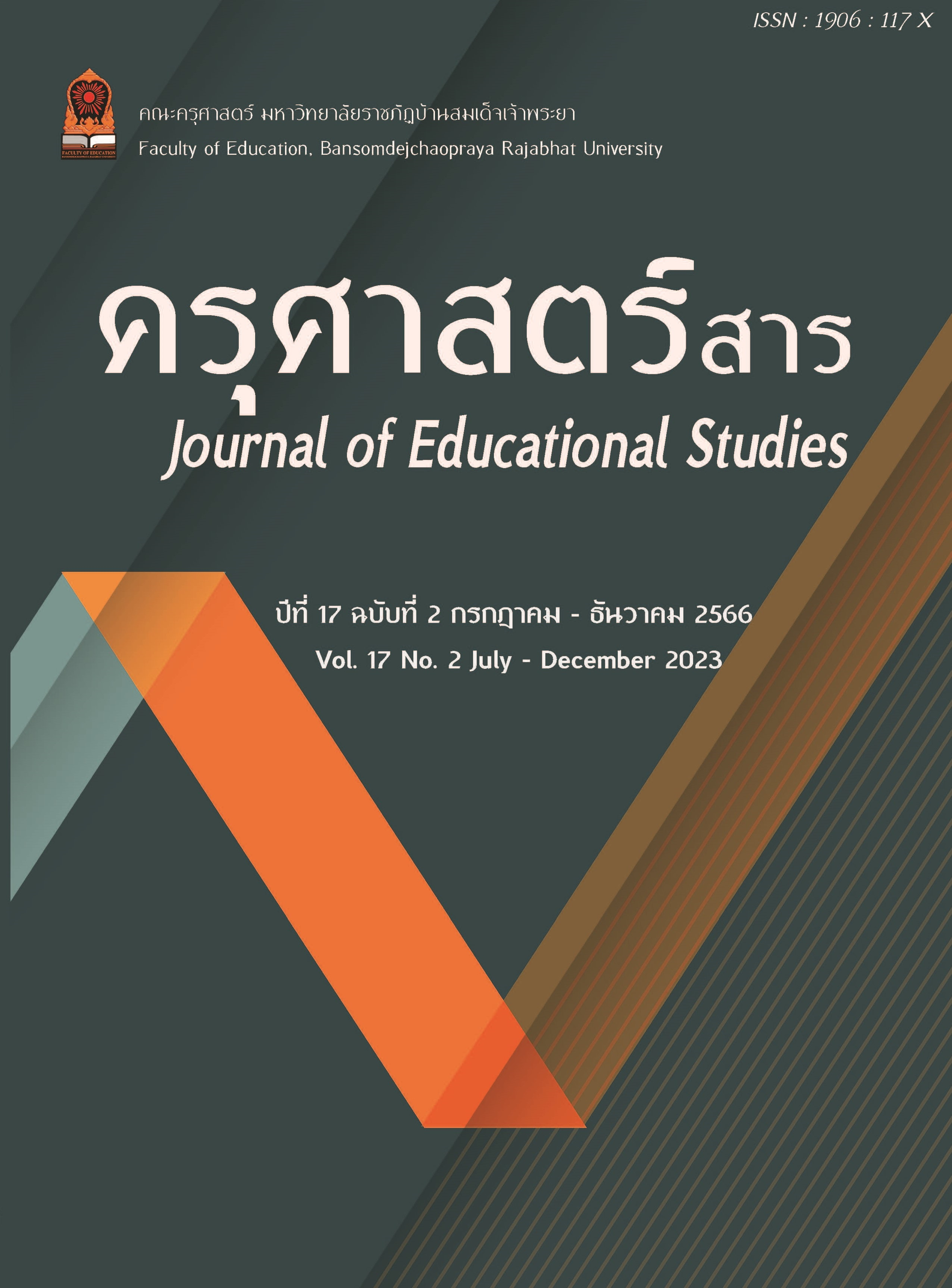Digital Games Based Learning Design
Keywords:
Digital Games Based Learning (DGBL), Digital Games Based Learning DesignAbstract
Digital Games Based Learning (DGBL) is an application or computer program designed to enhance the learning process and knowledge development of game players using digital media and technology to present learning content in a creative, interactive, and enjoyable manner. A key aspect of digital games-based learning is the seamless integration of learning content and game functionalities, resulting in effective learning outcomes. DGBL has emerged as an outstanding educational approach that leverages collaboration and interaction between players and digital games to enhance learning outcomes. This article aims to introduce the concept of six steps in the design process of digital games for learning. These steps include 1. Setting learning objectives 2. Identifying the target audience 3. Creating content details 4. Selecting the game platform5. Game design 6. Testing and refinement
The objective of these steps is to facilitate an understanding of how educational practitioners can incorporate the characteristics of digital games into the design of digital games for learning to achieve learning objectives and encourage learner engagement in the learning process.
Downloads
References
ปราวีณยา สุวรรณณัฐโชติ. (2561). สมรรถนะและบทบาทผู้สอนออนไลน์: การแสดงตนและสนับสนุนผู้เรียน. วารสารบัณฑิตศึกษา มหาวิทยาลัยราชภัฏวไลยอลงกรณ์ ในพระบรมราชูปถัมภ์, 12(2), น. 244-256.
ศูนย์พัฒนาและส่งเสริมการเรียนรู้ กระทรวงศึกษาธิการ. (2566). เกมส์แยกสี. การสร้างสีในโลก. กรุงเทพมหานคร: บริษัท อักษรศิลป์พาโนรามา จำกัด.
Amy Jo Kim. (2001). Gamification 101 : Design the player journey. Retrieved from https://www.slideshare.net/amyjokim/gamification-101-design-the-player-journey
Deterding, S., Dixon, D., Khaled, R., & Nacke, L. E. (2011). From game design elements to gamefulness: defining "gamification". Proceedings of the 15th International Academic MindTrek Conference: Envisioning Future Media Environments. ACM. Retrieved from https://doi.org/10.1145/2181037.2181040
Digital game-based learning (DGBL) model and development methodology for teaching history. Retrieved from https://www.academia.edu/78631847/Digital_Game_Based_Learning_DGBL_Model_and_Development_Methodology_for_Teaching_History
Erhel, S., & Jamet, E. (2013). Digital Game-Based Learning: Impact of Instructions and Feedback on Motivation and Learning Effectiveness. Computers and Education, 67, pp. 156-167. Retrieved from https://doi.org/10.1016/j.compedu.2013.02.019
Hamdi, L. F., Hantono, B. S., & Permanasari, A. E. (2022). Gamification Methods of Game‐Based Learning Applications in Medical Competence: A Systematic Literature Review. 2022 International Symposium on Information Technology and Digital Innovation (ISITDI 2022), Padang, Indonesia, pp. 50-54. Retrieved from https://ieeexplore.ieee.org/document/9944535
Hwang G.-J., Chiu L.-Y., & Chen C.-H. (2015). A contextual game-based learning approach to improving students' inquiry-based learning performance in social studies courses. Computers & Education, 81, pp. 13-25. Retrieved from https://dx.doi.org/10.1016/j.compedu.2014.09.006
Kengpol, A. (2018). The Thailand 4.0 Policy and Education Development. Procedia Computer Science, 139, pp. 258-265.
Lin, Y.-T. & Wang, T.-C. (2022). The Effects of Integrating Digital Board Game into Prime Factorization Learning on Elementary Students’ Flow Experience. 2022 International Conference on Advanced Learning Technologies (ICALT). Bucharest, Romania, pp. 122-124, doi: 10.1109/ICALT55010.2022.00044
Nor Azan Mat Zin, Azizah Jaafar & Wong Seng Yue (2009). Digital Game-Based Learning (Dgbl) Model And Development Methodology For Teaching History. Wseas Transactions On Computers, 2(8), pp. 322-333.
Pablo Moreno-Ger, Daniel Burgos, Iván Martínez-Ortiz, José Luis Sierra & Baltasar Fernández-Manjón. (2008). Educational game design for online education. Comput. Hum. Behav., 24(6), pp. 2530-2540.
Prensky, M. (2001). Digital Game-based learning. New York: McGraw-Hill. Retrieved from https://www.researchgate.net/publication/30874037_Digital_Game-Based_Learning
Suwannatthachote, P. & Pimdee, P. (2018). The Development of Education in the Era of Thailand 4.0. Journal of International Studies, 11(1), pp. 131-150.
Sarah Abu Bakar, S.N., Hafizah Mahamarowi, N., & Mustapha, S. (2022). Game-Based Learning as a Teaching and Learning Tool for Dyslexic Children. 2022 IEEE 10th Conference on Systems, Process & Control (ICSPC), pp. 50-55.
Whitton, N. (2010). Learning with Digital Games: A Practical Guide to Engaging Students in Higher Education. Retrieved from https://www.researchgate.net/publication/41125153_Learning_with_Digital_Games_A_Practical_Guide_to_Engaging_Students_in_Higher_Education
Downloads
Published
How to Cite
Issue
Section
License

This work is licensed under a Creative Commons Attribution-NonCommercial-NoDerivatives 4.0 International License.
บทความที่ได้รับการตีพิมพ์เป็นลิขสิทธิ์ของคณะครุศาสตร์ มหาวิทยาลัยราชภัฏบ้านสมเด็จเจ้าพระยา
ข้อความที่ปรากฏในบทความแต่ละเรื่องในวารสารวิชาการเล่มนี้เป็นความคิดเห็นส่วนตัวของผู้เขียนแต่ละท่านไม่เกี่ยวข้องกับมหาวิทยาลัยราชภัฏบ้านสมเด็จเจ้าพระยา และคณาจารย์ท่านอื่นๆในมหาวิทยาลัยฯ แต่อย่างใด ความรับผิดชอบองค์ประกอบทั้งหมดของบทความแต่ละเรื่องเป็นของผู้เขียนแต่ละท่าน หากมีความผิดพลาดใดๆ ผู้เขียนแต่ละท่านจะรับผิดชอบบทความของตนเอง



